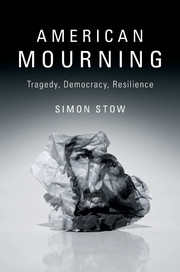Book contents
- American Mourning
- American Mourning
- Copyright page
- Dedication
- Dedication
- Contents
- Acknowledgments
- Introduction
- 1 Pericles at Gettysburg and Ground Zero: Tragedy, Patriotism, and Public Mourning
- 2 A Homegoing for Mrs. King: On the Democratic Value of African American Responses to Loss
- 3 Mourning bin Laden: Aeschylus, Victory, and the Democratic Necessity of Political Humanism
- 4 Homecoming and Reconstitution: Nostalgia, Mourning, and Military Return
- 5 Mourning as Democratic Resilience: Going on Together in the Face of Loss
- Index
1 - Pericles at Gettysburg and Ground Zero: Tragedy, Patriotism, and Public Mourning
Published online by Cambridge University Press: 13 July 2017
- American Mourning
- American Mourning
- Copyright page
- Dedication
- Dedication
- Contents
- Acknowledgments
- Introduction
- 1 Pericles at Gettysburg and Ground Zero: Tragedy, Patriotism, and Public Mourning
- 2 A Homegoing for Mrs. King: On the Democratic Value of African American Responses to Loss
- 3 Mourning bin Laden: Aeschylus, Victory, and the Democratic Necessity of Political Humanism
- 4 Homecoming and Reconstitution: Nostalgia, Mourning, and Military Return
- 5 Mourning as Democratic Resilience: Going on Together in the Face of Loss
- Index
Summary
- Type
- Chapter
- Information
- American MourningTragedy, Democracy, Resilience, pp. 24 - 56Publisher: Cambridge University PressPrint publication year: 2017

